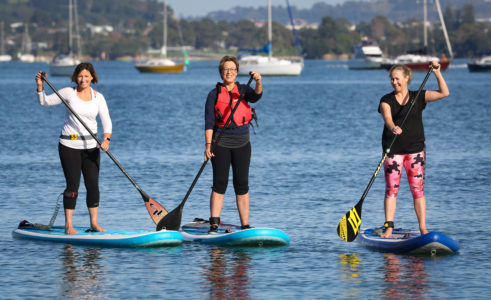
Anne McLean was never big on exercise.
She is a busy mother and preferred leisurely walking with a friend to high impact sport.
But when she was diagnosed with breast cancer for the second time, she knew she had to start taking her health and fitness seriously.
That was five years ago.
Today she is out on the smooth waters of Bucklands Beach on a paddle board, waving and laughing.
Anne is one of eight cancer survivors who recently took part in east Auckland’s first PaddleOn cancer rehabilitation programme and she says it has been life-changing.
“I never thought I would have the balance and stamina to paddle board but I definitely wanted to prove myself wrong and I did,” she says.
With more research suggesting exercise can significantly reduce your risk of cancer, she says paddle boarding is a great fun way to get fit without having to partake in high impact exercise that affects her knees and joints.
“It’s really given me something that’s easy on the body but is equally challenging and exciting,” she says.
Physiotherapist Catherine Noventa says the programme is a great way for cancer survivors to ease back into exercise and gain all the benefits of learning something new, having a laugh and meeting others who have experienced something similar to them.
She’s spent the past two years rallying to get PaddleOn and has successfully just finished the first Bucklands Beach programme, alongside stand up paddle board instructor Julie O’Meagher.
Noventa says it was good to see cancer survivors taking advantage of the rehabilitation available to them and getting out on the water.
“Often [cancer survivors] suffer for years following their treatment with serious fatigue, muscle problems and painful scarring just a small number of challenges they face,” she says.
There can be a lot of women, she says, who are taking long-term breast cancer medication which has negative impacts on the body.
“Women who end up with hormone receptive breast cancer can be taking medication for up to 10 years affect their hormone levels which then affects their soft tissues and joints,” she says.
This is why paddle boarding is good for them, Noventa says, because it’s important for them to exercise in a pain-free way.
While Anne said she is not still suffering any serious side effects of her cancer treatment five years ago, the PaddleOn programme has had a positive impact on her confidence, fitness and overall wellbeing.
The programme is available to anyone who has undergone cancer treatment including surgery, chemotherapy or radiotherapy in the last six years.
Sessions are subsidised by Pinc & Steel Cancer Rehabilitation Trust and costs $40 for eight sessions.
Participants must undergo a screening process prior to beginning the course to ensure they have the required fitness level.
To register go to www.pincandsteel.com.








